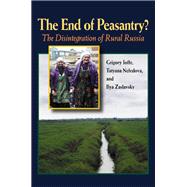
The End of Peasantry?
by Iogge, Grigory; Nefedova, Tatyana; Zaslavsky, Ilya-

This Item Qualifies for Free Shipping!*
*Excludes marketplace orders.
Buy New
Rent Textbook
Rent Digital
Used Textbook
We're Sorry
Sold Out
Summary
Author Biography
Tatyana Nefedova is senior research associate at the Institute of Geography in Moscow.
Ilya Zaslavsky is director of the Spatial Information Systems Laboratory at the San Diego Supercomputer Center, University of California, San Diego.
Table of Contents
| Introduction : where the story begins | p. 1 |
| Working land in Russia | p. 20 |
| Development in breadth, Russian style | p. 45 |
| Rural villagers | p. 79 |
| Market adjustment and spatial change | p. 107 |
| From spatial continuity to fragmentation | p. 130 |
| Regionalization | p. 156 |
| The transformation of Russian agriculture at close range | p. 171 |
| Conclusion : geography is destiny | p. 221 |
| Table of Contents provided by Blackwell. All Rights Reserved. |
An electronic version of this book is available through VitalSource.
This book is viewable on PC, Mac, iPhone, iPad, iPod Touch, and most smartphones.
By purchasing, you will be able to view this book online, as well as download it, for the chosen number of days.
Digital License
You are licensing a digital product for a set duration. Durations are set forth in the product description, with "Lifetime" typically meaning five (5) years of online access and permanent download to a supported device. All licenses are non-transferable.
More details can be found here.
A downloadable version of this book is available through the eCampus Reader or compatible Adobe readers.
Applications are available on iOS, Android, PC, Mac, and Windows Mobile platforms.
Please view the compatibility matrix prior to purchase.
